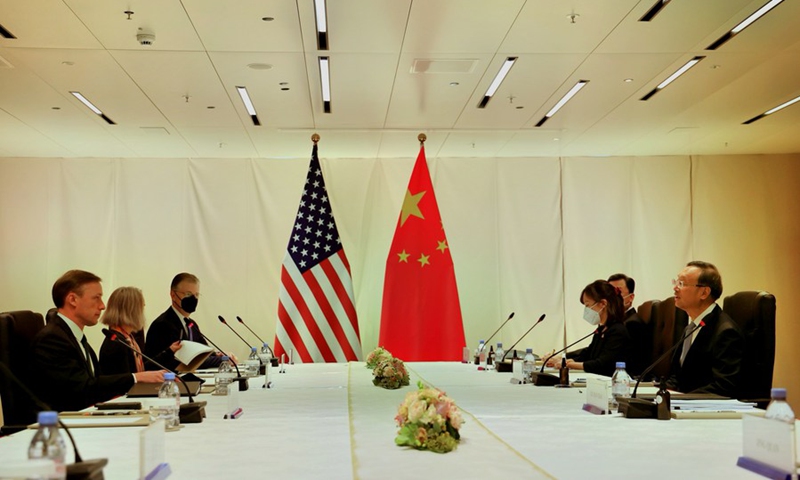
Yang Jiechi (1st R), a member of the Political Bureau of the Communist Party of China (CPC) Central Committee, met here Wednesday with U.S. National Security Advisor Jake Sullivan (1st L) (Photo: Xinhua)
The "constructive" meeting between China's top diplomat Yang Jiechi and US National Security Advisor Jake Sullivan, and the highly expected "frank conversations" between Chinese and US trade officials, indicate the increasing normalization of bilateral talks and negotiations, experts said on Thursday.
However, trade tensions between the two largest economies are likely to linger as each side's demands remain unchanged, experts said, urging the US to ease export restrictions on Chinese technology companies like Huawei for win-win cooperation.
China opposes defining China-US relations as "competitive," Yang, a member of the Political Bureau of the Communist Party of China (CPC) Central Committee, said while meeting Sullivan in Zurich on Wednesday.
"When China and the US cooperate, the two countries and the world will benefit; when China and the US are in confrontation, the two countries and the world will suffer," Yang said.
Earlier this week, US Trade Representative Katherine Tai said at the Center for Strategic and International Studies (CSIS), a US think tank in Washington that she intended to have frank conversations with her Chinese counterparts, including talks over the phase one trade agreement, noting that the talks are not intended to "inflame trade tensions with China."
Tai said that the US will not seek an economic decoupling from China, and instead she will seek a "recoupling" that will bring more benefits to American businesses, including larger access to China's huge market.
"Unlike his predecessor Donald Trump's aggressiveness, the Biden administration aims to maintain negotiations while mounting trade restrictions. In a way, it accords with the stance of China, which seeks to solve disputes through dialogue," Huo Jianguo, former president of the research institute of the Ministry of Commerce, told the Global Times on Thursday.
But this does not mean there's been a change in the trade policy toward China, as US President Joe Biden would not immediately remove tariffs on around $370 billion worth of Chinese goods imposed by the previous Trump administration, and it is constantly criticizing China on issues like so-called unfair trade practices.
The US may have realized that it has to resolve bilateral trade friction in a more pragmatic manner, given that there are no alternatives for Chinese products, nor can there be a forced move of industry chains out of China, Gao Lingyun, an expert at the Chinese Academy of Social Sciences in Beijing, told the Global Times.
A recent report released by the American Chamber Commerce in Shanghai showed that most US companies operating in China are optimistic about profits and plan to invest more in China.
Of the 125 respondents that said they manufacture in China, 72 percent have no plans to move manufacturing out of China in the next three years, while no companies are relocating their production from China to the US.
However, Gao maintains a "cautiously optimistic" attitude toward trade ties between the two countries, noting that there are a range of unresolved, complicated issues that go far beyond trade.
While the US side constantly blames China for failing to achieve the import goal set in the phase one trade deal, experts said that the US' combative economic approach to contain China's rise - from restricting supplies to Huawei to the export of radioactive materials to China's state-owned nuclear company CGN - greatly undercuts China's import volume.
"The US' crackdown on Chinese technology companies such as Huawei is the core hindering normal China-US economic and trade relations," Huo said.
Before being put on a trade blacklist by the Trump administration, Huawei was one of the US chip industry's biggest customers. The world's largest telecom equipment maker spent around $12 billion a year importing chips from the US, which contributed to 40,000 US jobs, according to media reports.
Although the trade ban was designed to contain Huawei's development, those curbs seriously inhibited American businesses' exports to China over the past two years, pushing the Biden administration to rethink its hardline stance.
China's total trade with the US fell 9 percent to 2.42 trillion yuan ($340 billion), while the trade surplus in favor of China expanded 7.7 percent to reach 1.33 trillion yuan, from January to August this year.
Huo said that it's unlikely for China-US economic and trade relations to return to the pre-trade war period. "The US should drop its confrontational mentality toward China and facilitate competitive cooperation via dialogue and negotiations," he said, noting that it's the only solution to assuage years of trade tensions.




